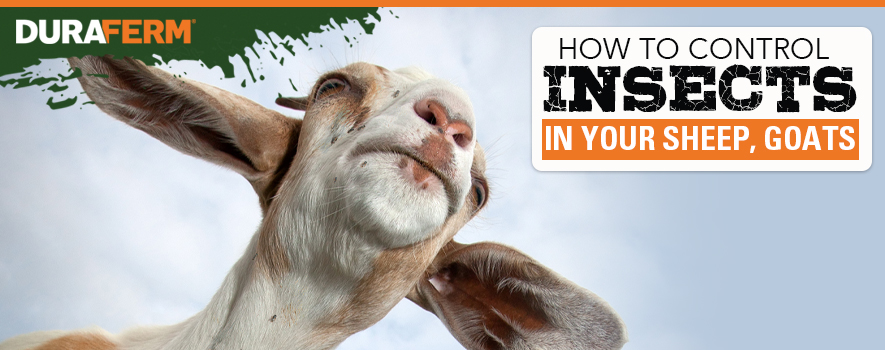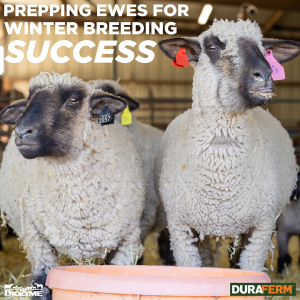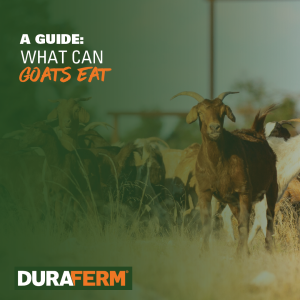
If you own livestock, you’ve got insects. And, if you’ve got sheep or goats, you’ve not only got flies, but ticks and other bugs that can lead to economic losses and physical harm and discomfort to your animals. Summer heat and rains create ideal breeding conditions for many of these pests, but with some planning and preparation, producers can take a proactive approach to eliminating the diseases and harm these insects bring.
The Challenges
Some of the biggest nuisances include a variety of flies, ticks, sheep keds and lice. These small but mighty creatures can impact your animals’ health through biting and spreading of disease and also through overall performance of loss of gain or milk if the animal gets extremely sick from an insect-borne illness.
Stable flies, house flies and face flies are all a major irritation to sheep and goats. House flies are a key carrier of diseases with more than 60 human and animal diseases being traced back to the house fly. The bites of a stable fly are painful, and the stable fly will search for its next meal, aka bite the sheep and goats where it causes the most pain—in the flank and on the legs.
Especially during the summer months, the fly bites cause stress in livestock, resulting in less intake and reducing performance in pounds gained and converted due to reduced grazing. Typically, if you notice livestock bunching in a group, that is an indicator that the bite pain is severe enough to impact production and profits.
Sheep keds and ticks are other insects that suck blood, transmit disease and will cause enough stress to lower performance. The female sheep keds have a life span of 6 to 8 months and in that time can produce up to 15 offspring, which result in more bites and irritation. Sheep keds are a primary transmitter of the blue tongue virus.
The Control
There are several ways to control the flying, biting and sucking pests that your sheep and goats will encounter during the summer. First, make sure you have sheared your sheep to give the insects less room to inhabit. Next, it is important to keep your barnyard, corrals, barn and other areas as free of waste, wet feed and hay and sitting water as possible. If you keep your sheep and goats in pens next to the barn, be sure to keep those lots as clean and dry as possible. Cleaning weekly will help break up the life cycle of the flies, which is usually about 10 days.
Using fly traps or fly strips in and around barns is also a good way to help control flies. Using a pour-on or drench insecticide after the sheep are sheared is also an effective method at keeping flies off sheep. Ideally, a combination of methods works best to keep these tiny pests off sheep and goats, keep them healthy and stress-free.
“Anytime we can reduce the fly load on our sheep and goats, that is going to reduce their stress because they are not going to be expending their energy fighting off flies,” said Sam Silvers, sheep and goat breeder and BioZyme® Inc. Area Sales Manager from West Texas.
Another all-natural method that helps discourage flies from landing on your sheep and goats is by feeding a high-quality nutrition program from DuraFerm® with the HEAT® pack. DuraFerm Sheep Concept•Aid® HEAT is a complete vitamin and mineral specifically designed to help prevent heat stress during temperatures of 70 degrees or above. The HEAT package includes garlic to deter insects.
“The garlic in that HEAT pack will help control some of those flies, which we battle on the sheep side every year with some ewes contracting blue tongue or other fly-borne illnesses. If we can control the flies, that garlic is also helping control the stress of not having to stand there and fight off flies all day long,” Silvers said.
Simple, proactive management practices can help your goat herd and sheep flock flourish in the summer. Shear sheep before the summer heat starts to keep insects out of their wool, keep their surrounding area clean and dry, provide an insecticide pour-our or powder to help deter flies and ticks and feed DuraFerm Sheep Concept•Aid HEAT to keep flies away with the garlic. Like anything, there is power in numbers, and using a combination of these practices will help keep your sheep and goats freer of little nuisances that can cost you big dollars.

